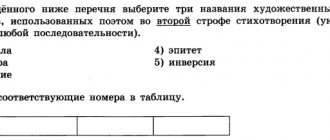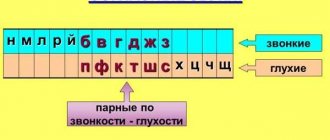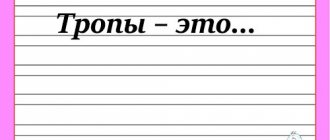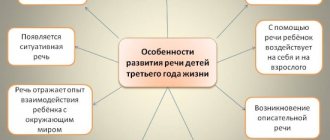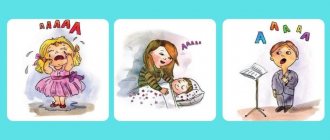Lexical means: tropes
Allegory - Themis (woman with scales) - justice. Replacement of an abstract concept with a concrete image.Hyperbola — Bloomers as wide as the Black Sea (N. Gogol) Artistic exaggeration.Irony - Where are you getting your head from, smart one? (Fable by I. Krylov). Subtle mockery, used in the opposite sense to the direct one. Lexical repetition - Lakes all around, deep lakes. Repetition of the same word or phrase in the textLitota - A small man. An artistic understatement of the described object or phenomenon.Metaphor — Sleepy lake of the city (A. Blok) Figurative meaning of the word based on similarityMetonymy — The class was noisyReplacing one word with another based on the contiguity of two conceptsOccasionalisms - The fruits of education. Artistic means formed by the author.Personification - It is raining. Nature rejoices. Endowing inanimate objects with the properties of living things. Periphrase — Leo = king of beasts. Substitution of a word with an expression similar in lexical meaning.Sarcasm — The works of Saltykov-Shchedrin are full of sarcasm. Caustic, subtle mockery, the highest form of irony.Comparison -When a nightingale speaks a word, it sings. In comparison, there is both that which is compared and that with which it is compared. Conjunctions are often used: as, as if, as if. Synecdoche - Every a penny brings (money) into the house. Transfer of value based on quantitative characteristics.Epithet - “ruddy dawn”, “golden hands”, “silver voice”. A colorful, expressive definition that is based on a hidden comparison.Synonyms - 1) run - rush. 2) The noise (rustle) of leaves. 1) Words that are different in spelling, but close in meaning. 2) Contextual synonyms - words that are similar in meaning in the same context Antonyms - original - fake, callous - responsiveWords with opposite meaningsArchaism - eyes - eyes, cheeks - cheeksAn outdated word or figure of speechin the form of a convenient table for completing task No. 26. Below is a table containing the most complete collection of means of expression (phonetic, lexical and stylistic) with definitions and examples.
I. Phonetic (sound writing)
| Example | ||
| Alliteration | Repetition of consonants creating an image | At midnight sometimes in the wilderness of the swamp / You can barely hear , silently rustle the reeds - a of hissing consonants helps convey the rustle of the reeds |
| Assonance | Vowel repetition creating an image | I love Russian birch , sometimes bright , sometimes sad - conveys slight sadness , tenderness _ _ |
II.
Lexical (tropes)
| Epithet | Colorful, figurative definition in a figurative meaning. Emphasizes the most significant features. | And you will not wash away righteous blood of the poet black . Lonely sail ; cheerful wind; chattering magpie; greedily . |
| Comparison | An expression or word in which one phenomenon or concept is explained by comparing it with another. Most often, the comparison is formalized in the form of a comparative phrase, starting with conjunctions: as, exactly, as if, as if, as if, that | Like a silent sea , the whole army is worried. Brevity, like pearls , shines with content. |
| Metaphor | A trope based on the similarity of two phenomena. Sometimes a metaphor is called a hidden comparison, since it is based on a comparison, but it is not formalized using comparative conjunctions | Diamond fly / With a cheerful noise towards the clouds - (sparkling like a diamond); Sleepy lake, dry leaves , church onions a warm welcome, a chain of mountains, the tail of a train. |
| Metonymy | Replacing one word with another of similar meaning. | Hey you, hat ! (man in a hat) Reading Bulgakov ... (his books) The entire boarding house recognized the superiority of D.I. Pisareva |
| Synecdoche | A type of metonymy: the whole is revealed through its part or vice versa | Every penny brings (money) into the house; And you could hear how the Frenchman (the French army) |
| Allegory | Depiction of an abstract concept or phenomenon through a concrete image | The fox is an allegory of cunning, the hare - cowardice |
| Irony | A word or expression used in a sense opposite to its intended meaning | You are so smart ! (=stupid) |
| Personification | The properties of a living being are attributed to an inanimate object | The trees, bending towards me, extended their thin hands . |
| Hyperbola | Exaggeration | At one hundred and forty suns the sunset glowed |
| Litotes | Understatement | Your Spitz, your lovely Spitz, is no more than a thimble ; Below a thin piece of grass You have to bow your head, So that the little orphan in the world can live a carefree life. |
| Paraphrase(s) | A word or expression is replaced by a synonymous one to avoid repetition | Leo = king of beasts Oil = black gold Spring = morning of the year |
| Synonyms | 1) Words that are different in spelling, but close in meaning. 2) Contextual synonyms - words that are similar in meaning in the same context | 1) Win-overcome; run - rush. 2) Ostankino needle (tower); talk (murmur) of waves; noise (rustle) of leaves. |
| Antonyms | Words with opposite meanings | Cunning and Love ; Whiter is only the shine, blacker is the shadow. |
| Archaism | An obsolete word or figure of speech | We are tormented by spiritual thirst, I dragged myself , and a six-winged seraphim at a crossroads ... |
| Dialectism | A word or phrase existing in a certain area ( territorial dialectism ), social group ( social dialectism ) or profession ( professional dialectism ) | The rooster is clucking , the ladle is scrunching , leveling with a rake is speeding |
| Jargon | Speech of a social group, different from the general language, containing many artificial words and expressions | “ Smell ” is from the jargon of hunters, “ amba ” is from the sea. |
| Neologism | A newly formed word that appeared in connection with the emergence of new concepts in life | " Mediocrity " instead of "mediocrity" |
| Aphorism | A generalized, deep thought of the author, distinguished by precise expressiveness and obvious unexpectedness of judgment. The aphorism has an author | “The powerful are always to blame for the powerless” |
| Phraseologism | Lexically indivisible, stable, integral in meaning phrase, reproduced in the form of a ready-made speech unit | To kick the bucket, hand on heart, bury talent in the ground, bosom friend, sworn enemy, delicate situation |
III. Stylistic figures
| Anaphora (lexical repetition) | Repeating parts at the beginning of lines (unity of beginning) | This morning, this joy, This power of day and light, This blue vault, This cry and strings, These flocks, these birds... |
| Epiphora (lexical repetition) | Repetition of parts, same syntactic construction at the end of sentences | to you all my life . in you all my life . you all my life . |
| Compositional junction (lexical repetition) | Repetition at the beginning of a new sentence of a word or words from a previous sentence, usually ending it | Motherland did everything for me . homeland taught me, raised me, and gave me a start in life . A life I'm proud of. |
| Antithesis | Opposition | Long hair - short ; Yesterday I was choking with happiness, and today I am screaming in pain. |
| Gradation | Arrangement of synonyms according to the degree of increase or decrease of the characteristic | Huge blue eyes glowed , burned , and shone on her face But you must understand this loneliness, accept it, make friends with it and overcome it ... |
| Oxymoron | Connecting words that contradict each other, logically exclude each other | Look, it’s fun for her to be sad so elegantly naked . Dead souls , living corpse , hot snow |
| Inversion | Changing the usual word order. Usually: attribute + subject + adverbial + predicate verb + object (e.g. The autumn rain was loudly knocking on the roof) | He came - he came ; It was a shame, they were expecting a fight ; He passed the doorman and flew up the marble steps like an arrow . – (cf. “he flew past the doorman like an arrow”) |
| Parallelism | Comparison in the form of juxtaposition | Parallelism can be direct : The graves are overgrown with grass - is overgrown and the negative one , in which the coincidence of the main features of the compared phenomena is emphasized: It is not the wind that bends the branch, is not the oak tree that makes noise - It is my heart that groans, Like an autumn leaf trembling. |
| Ellipsis | Omission of some part of the sentence that is easily restored from the context | Guys - for the axes! (the word “taken” is missing) |
| Parcellation | Division of a single meaning statement into independent sentences | And again Gulliver. Costs. Slouching. |
| Polyunion (polysyndeton) | Homogeneous members or sentences connected by repeating conjunctions | How strange, and alluring, and carrying, and wonderful is the word road! And how wonderful this road itself is. |
| Asyndeton | Homogeneous members of a sentence are connected without the help of conjunctions | Swede, Russian stabs, chops, cuts ... |
| Rhetorical exclamation | An exclamation that enhances the expression of feelings in the text | Who hasn't scolded the stationmasters?! |
| A rhetorical question | A question that is asked not with the goal of giving or receiving an answer, but with the goal of having an emotional impact on the reader | What Russian doesn't like driving fast ? = “all Russians love” |
| Rhetorical appeal | An appeal directed not to a real interlocutor, but to the subject of an artistic depiction | Farewell, unwashed Russia ! |
| Default | Deliberate interruption of speech in anticipation of the reader's guess, who must mentally complete the phrase | But listen: if I owe you ... I own a dagger, / I was born near the Caucasus. |
| Paradox | A judgment that is sharply contrary to common sense, but deep in meaning | A coward dies many times, a brave man only once; Hurry up slowly; The worse the better |
| Evaluative vocabulary | Direct author's assessment of events, phenomena, objects | Pushkin is a miracle . |
| Expressive vocabulary | Words expressing affection, joke, irony, disapproval, disdain, familiarity, etc. | Fool, son, silly, rhymer, dunce, drunkard, talker |
This table does not represent all means of expression. In a more convenient and complete form (pdf format) you can download this topic from the links below.
Complete collections of materials on the Russian language are available below: Collection of materials for the Unified State Exam in the Russian language Collection of materials for the Unified State Exam in the Russian language
Syntactic means
Anaphora - The thunderstorm was not in vain. Repetition of words or combinations of words at the beginning of sentences or poetic lines.Antithesis - Long hair - short mind;.Contrast.Gradation - I came, I saw, I conquered! Arrangement of words and expressions in increasing (ascending) or decreasing (descending) significance.Inversion - Once upon a time there lived a grandfather and a woman. Reverse word order.Compositional junction (lexical repetition) - It was a wonderful sound. It was the best voice I've heard in years. Repeating at the beginning of a new sentence words from the previous sentence, usually ending it. Multi-union - The ocean walked before my eyes, and swayed, and thundered, and sparkled, and faded away. Deliberate use of a repeating conjunction.Oxymoron - Dead souls. A combination of words that cannot be combined in meaning.Parcellation - He saw me and froze. I was surprised. Silenced. Deliberate division of a sentence into semantically significant segments. Rhetorical question, exclamation, appeal - What a summer, what a summer! Who hasn’t cursed the stationmasters, who hasn’t sworn at them? Citizens, let's make our city green and cozy! Expressing a statement in interrogative form; to attract attention; increased emotional impact. Series, pairwise combination of homogeneous members - Nature helps to fight loneliness, overcome despair, powerlessness, forget hostility, envy, and the deceit of friends. The use of homogeneous members for greater artistic expressiveness of the textSyntactic parallelism - To be able to speak is an art. Listening is a culture. (D. Likhachev) Similar, parallel construction of phrases and lines. Default - But listen: if I owe you... I own a dagger, / I was born near the Caucasus. The author deliberately understates something, interrupts the hero’s thoughts so that the reader can think for himself what he wanted to say.Ellipsis - Guys - for the axes! (the word “taken” is missing) Omission of some member of the sentence that is easily restored from the context Epiphora - I've been coming to you all my life. I believed in you all my life. Same ending for several sentences.Important table and references
For those who want to make their speech rich and vivid, for the convenience of perceiving the material, all the terms are summarized in a table from which you can see the name of the language device, its meaning and examples of the use of artistic and visual devices in literature:
And if you want to “plunge deeper into this topic”), here is a list of dictionaries, including figurative and expressive means of the Russian language:
Phonetic means: sound recording
Alliteration - Completehsometimes in the swamp depthswAnd/ Hwow wordswbut, damnwsmart wurshat kamawand - a combination of hissing consonants helps to convey the rustling of the reeds. The repetition of consonants creates an image.Assonance - LYublYu birch treesat Ratsskwow It's brightwow, then gratstnwow – conveys slight sadness and tenderness. Repetition of vowels, creating an image.Gradation - I came, I saw, I conquered! The arrangement of words and expressions is in ascending order (inSolve task 26 of the Unified State Exam in the Russian language with answers.
The role of visual and expressive means in literature and beyond
There are so many tools for creating an image, conveying the smallest shades of mood, conveying atmosphere, evoking emotions, reflecting the entire palette of colors of life and remaining in memory for a long time!
The great and powerful Russian language is rightfully considered as such precisely because it makes it possible to express one’s feelings, to make communication lively and sincere.
The means of artistic representation are used not only in literature. They also decorate our colloquial, everyday speech.
We, without hesitation, use figurative and expressive words: “cornflower blue eyes”, “blind rain”, “golden hands”, “brilliant mind”, “soul sings”, “head is buzzing”, “scared to death”, “a hundred years I know you,” “the cat cried,” “the weather is whispering,” and we understand perfectly well what we are talking about.
Some tips on using language tools
Do not overuse cliches and cliches of official business, scientific style in colloquial speech.
Terminology should be consistent with the style and topic. If there are two versions of the term - Russian and foreign, give preference to the first.
Phraseologisms are used only if they know their exact meaning.
The overuse of colloquialisms and jargon in colloquial speech should become taboo: it is bad form.
In an official setting, oral speech should be based on a system of linguistic means that corresponds to the official business style.
Now you know what it is - language tools, and, having memorized their basic sets, you can competently format text of any style and type.
In this video you will learn more about the language tools of the scientific style:
Some nuances
Without fully understanding the purpose for which one or another construction can be used, it is better to avoid repetitions, on which most figurative means are based. It is also important to consider that the impression largely depends on the role of the part of speech, which can be main or auxiliary. The phonetic environment also matters.
In addition to syntactic and lexical means, there are morphological ones . This is a series of techniques based on the frequent use of verbs, adjectives, nouns or other parts of speech. Tasks can be different: convey dynamism, emphasize the sounds of nature, make the description more rich, focus the reader’s attention on anxiety, calm, serenity, and so on. The ability to understand the means of artistic expression and use them for their intended purpose will help make oral and written speech rich, vibrant and meaningful.
